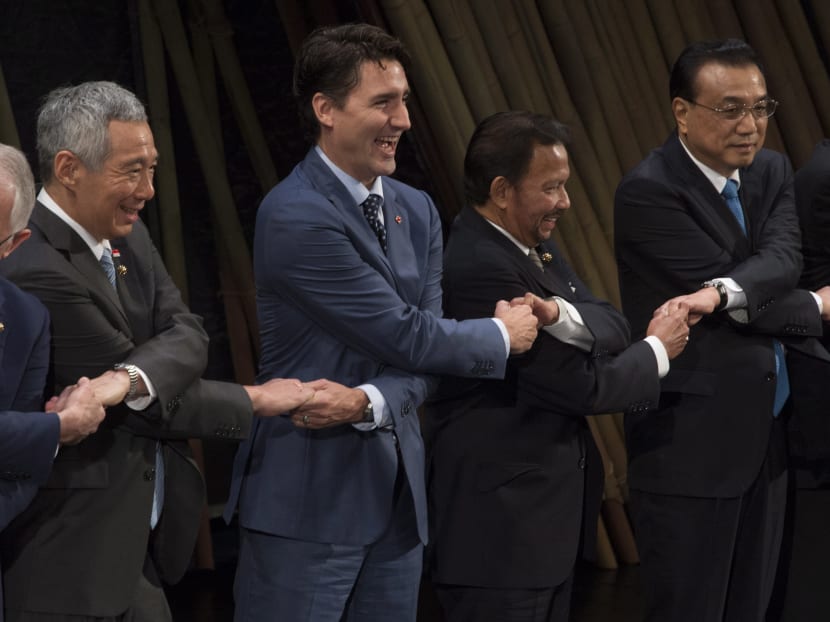Asean must strive to remain relevant and competitive, says PM Lee
MANILA — With Singapore chairing the Association of South-east Asian Nations (Asean) next year, Prime Minister Lee Hsien Loong has pledged to strengthen co-operation among member states to tackle non-traditional and emerging threats as well as to better integrate their economies.

Leaders from the different countries at the opening ceremony for the Association for Southeast Asian Nations conference in Manila, Philippines. Photo: AP
MANILA — With Singapore chairing the Association of South-east Asian Nations (Asean) next year, Prime Minister Lee Hsien Loong has pledged to strengthen co-operation among member states to tackle non-traditional and emerging threats as well as to better integrate their economies.
Building an Asean Community that is "relevant and citizen-centric", and remaining engaged with key partners in the region will also be the focus under the Republic's chairmanship, Mr Lee told a plenary session of the Asean Summit in Manila.
"As long as we stay united, resilient and adaptable, I am confident that Asean will continue to prosper and we will forge a stronger Community," he said.
Noting that Asean has come a long way since its founding 50 years ago, he urged leaders of the 10 South-east Asian member-states to strive to keep the grouping "relevant, competitive and prosperous".
Mr Lee outlined four ways Asean could do so.
First, member states have to press ahead with economic integration efforts, against a climate of anti-globalisation and protectionism.
Asean must also aim for "high-quality" trade agreements that benefit businesses and the people.
Welcoming two free trade and investment pacts which were inked between Asean and Hong Kong on Sunday, Mr Lee said Asean must keep at its efforts to conclude a high-quality Regional Comprehensive Economic Partnership (RCEP) agreement.
The RCEP, when concluded, will have 16 member-countries — including the 10 Asean member-states — that together make up about half of the world's population, almost a third of global gross domestic product, and a quarter of world exports.
Second, with Asean's populations adept at technology, adaptive to innovation and Internet-savvy, the group is "well-placed to seize the opportunities of technology and globalisation to create jobs and growth for our countries", Mr Lee said.
Over the next decade, Asean's digital economy is projected to grow five-fold to about US$200 billion (S$272.2 billion).
However, amid the threat of terrorism, which has climbed sharply in recent years, Mr Lee said it was important for Asean member-states to strengthen co-operation to counter the threat.
"Asean must be resilient in the face of terrorism and emerging non-traditional security threats," Mr Lee said.
The Islamic State of Iraq and Syria (Isis) has attempted to establish a caliphate in South-east Asia, most recently occupying parts of the Philippine city of Marawi until its defeat by military forces.
While Mr Lee congratulated the Philippines for ending the siege in Marawi, which left more than 1,100 combatants and civilians dead, he said South-east Asia may see an increased flow of returning fighters as Isis loses ground in Syria and Iraq.
"Law-enforcement agencies must continue to coordinate closely, to exchange timely intelligence," he reiterated.
Fourth, Asean must maintain unity and credibility on regional and global issues, including North Korea's recent nuclear and ballistic missile tests, said Mr Lee.
The group must continue to call for North Korea to conform to its international obligations and commitments, he added.
On the South China Sea, Mr Lee said he looked forward to "deeper and more substantive co-operation" between Asean and China, including the official start of negotiations on a code of conduct which was announced later on Monday.
He welcomed the "calmer atmospherics and collective efforts" by all parties to build trust and confidence with one another.
In August, Asean nations approved a framework for the code of conduct along with China, which stakes claim to much of the disputed waterway.
China's claims have been disputed by neighbouring states in the region, including Brunei, the Philippines, Malaysia and Vietnam, though tensions have eased somewhat lately.
To de-escalate tensions and minimise the risk of miscalculations, it was also important for the region's militaries to continue pursuing practical confidence-building measures, said Mr Lee.
Asean should build on its joint statement with China on the application of the Code for Unplanned Encounters at Sea to develop a set of common guidelines on how military vessels and aircraft should interact when they encounter one another unexpectedly, he added.
At the summit opening ceremony in Manila, Philippine President Rodrigo Duterte, whose country holds the grouping's rotating chairmanship this year, said in a speech that the two days of meetings "present an excellent opportunity for us to engage in meaningful discussion on matters of regional and international importance."
"Terrorism and violent extremism endanger the peace, stability and security of our region because these threats know no boundaries," said Mr Duterte.
His spokesman Harry Roque, who sat in at the summit, said the leaders talked mainly about terrorism and violent extremism, territorial disputes in the South China Sea, North Korea's nuclear and missile threats, and the humanitarian crisis in Myanmar's Rakhine State.
On North Korea, Mr Roque said the leaders expressed "grave concern" over Pyongyang's belligerent activities and urged denuclearisation, even as they said "there must be communication" with Pyongyang.
Following their summit, the 10 Asean leaders later met separately with leaders of the United States, China, South Korea, Japan, and the United Nations.








